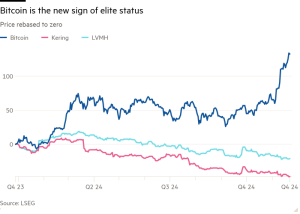A radical simplification of the NHS is now upon us
Unlock the Editor’s Digest for free
Roula Khalaf, Editor of the FT, selects her favourite stories in this weekly newsletter.
Since the founding of the NHS it has been heresy to suggest that Britain’s healthcare system is inefficient, that good staff are swallowed up by Byzantine processes and that patients face a shocking lottery of care. To do so was to be accused — usually by the Labour party — of wanting to “sell out” the NHS to sinister private interests. Now, Sir Keir Starmer has said that pouring money in hasn’t worked, and that wholesale change is needed.
This is a Nixon to China moment. Only a Labour health secretary could say, like Wes Streeting, that the level of health spending risks Britain becoming “the NHS with a small country attached”. Only a Labour prime minister could state, as Starmer did: “No more money without reform.” The uneasy drift of the new government’s first nine weeks, in the long wait for the October Budget, is over. The ambition is nothing less than to escape the stranglehold of the 1948 model, and build a 21st-century service to put patients first.
This is a political imperative. Getting waiting lists down, a senior government adviser told me this week, is as existential an issue for Labour as immigration was for the Tories. The country is staggering under the weight of sickness and public dissatisfaction with the NHS is at a record high. To tackle the backlog will require a rerun of New Labour’s formula: offering patient choice and using private sector capacity. This proved spectacularly successful under Alan Milburn (now advising Streeting). But bigger changes are also needed.
Lord Darzi’s review of the NHS this week is devastating. It’s the kind of crisp, powerful diagnosis you would expect from a leading surgeon — and one involved in previous attempts to improve the service to which he has devoted his life. It blasts the Conservatives’ disastrous reorganisation of the health service, poor management capability and a £37bn shortfall in capital investment in buildings and diagnostic equipment. This, it says, led the NHS to cancel more routine care in the pandemic than any other developed country: an astounding finding.
This is not shroud waving. While the report will strengthen Streeting’s hand with the Treasury in terms of capital investment, it is emphatic that money is being spent on the wrong things and that productivity is too low. Hospital staffing has risen 17 per cent since 2019, but the number of operations per surgeon has fallen by 12 per cent in that time. Darzi attributes this to a lack of investment in infrastructure, too much of the budget going to hospitals rather than community and social care and to clinicians having to solve “process problems”. These, if my recent conversations with medics are anything to go by, include phoning the wards trying to find a bed or discovering that the patient they are about to treat hasn’t been properly prepped.
Technology will be central to productivity. Darzi — nicknamed “Robo Doc” for his use of robots in operations — is compelling on the NHS failure to embrace even the most basic platforms, around for years but still a “novelty” in our system. Where most other big organisations have increased capital to replace labour, the NHS seems to have increased labour to replace capital.
The report underpins Streeting’s three big promises: to move the NHS from analogue to digital, shift more care from hospitals to communities and prevent sickness, not just treat it. Achieving each of these will require facing down vested interests. One is the NHS executive class and related quangos, at which Darzi takes an elegant but deadly swipe: “Too many people holding people to account, rather than doing the job, can be counterproductive.” A radical simplification is in order.
Another group that will be uneasy with the message is the British Medical Association, Britain’s most powerful trade union. The BMA speaks the language of change while often trying to block it. In recent years, it has undermined attempts to integrate patient data, despite being shown that it can improve care and reduce workloads. It opposed the introduction of a potentially transformative cholesterol-lowering drug out of “concern over funding” — code for GPs not getting paid enough to inject it, according to Sir John Bell. It has held patients to ransom with rolling strikes and a totally unrealistic demand for a 35 per cent pay rise for junior doctors. It has now asked GPs to take “collective action”, reducing the number of patients they see, in protest against proposed contract changes.
Historically, the BMA gets its way. In 1948, it successfully insisted that GPs should remain self-employed, not part of the health service. In 2004, it persuaded Tony Blair to pay them more while letting them drop their responsibility to see patients out of hours in emergencies. But public patience is wearing thin.
Starmer and Streeting may be able to extract a quid pro quo. On the NHS frontline, there are many good people fed up with outdated IT who want joined-up data; who would be thrilled if they didn’t have to answer so many data requests from faceless agencies; who are hindered in their attempts to help patients by specialist silos.
There has long been an assumption that a Labour government would dole out more money and shore up the status quo. Despite Streeting’s openness about his desire for reform, many wondered whether he was serious — and if he had the prime minister’s backing. Now, we know. The government has set its sights on a 21st-century healthcare system. And in doing so it has given hope to every reformer, every doctor and nurse who wants better for their patients.
#radical #simplification #NHS







